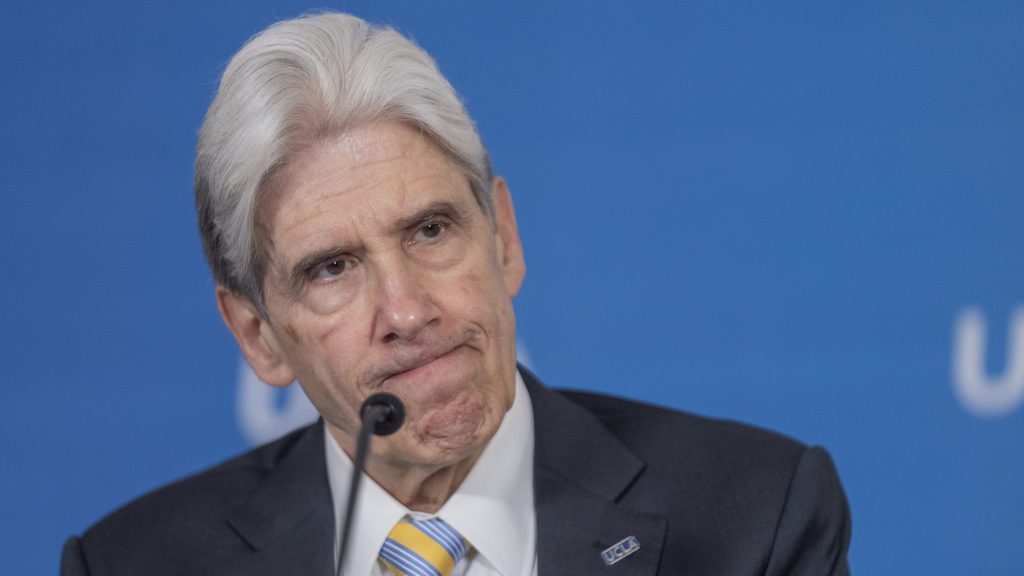
Roughly five months after he took the job, Dr. Julio Frenk was officially inaugurated as UCLA‘s chancellor Thursday, acknowledging that institutes of higher learning in the United States are facing a deteriorating relationship with the federal government and a crisis of public trust.
Speaking to a packed house of faculty, family and local dignitaries at UCLA’s Royce Hall, Frenk also outlined his vision for the university’s future and expressed hope for unity on a campus that has been rocked over the past year due to a mass pro-Palestinian protest that led to dozens of arrests in a coordinated law enforcement raid, and accusations of anti-Semitism for allowing the protesters to proliferate on the campus.
“I stand today before you with a deep sense of gratitude and responsibility for the opportunity to lead an extraordinary university at an extraordinary time,” Frenk said. “Higher education in the United States faces its moment of greatest challenge in living memory. Public confidence in the value of universities is eroding, and their long-established partnership with the federal government is under severe stress.
“At UCLA, our standing as a center of unmatched creativity, innovation and democratic values is being questioned. We must meet the moment with courage, resilience and wisdom. I am determined to channel the powerful mix of talent and commitment that defines the Bruin spirit to make sure that UCLA continues to advance the values that underpin our value to society. Those values are the search for truth, freedom of expression, respectful disagreement, expansion of opportunity, embrace of difference, dedication to service and the relentless pursuit of inclusive excellence.”
Frenk, the first Latino to ever lead the Westwood university, took over as UCLA chancellor at the beginning of January, replacing Gene Block, who stepped down on July 31 of last year. UCLA Executive Vice Chancellor and Provost Darnell Hunt served as interim chancellor until Frenk’s arrival in January.
Frenk, 70, served as Mexico’s Federal Secretary of Health from 2000 to 2006 and was credited with overhauling the nation’s health system and expanding care to millions of uninsured people. He also founded the National Institute of Public Health in Mexico. He also previously held an executive position with the World Health Organization and the Bill & Melinda Gates Foundation. From 2009-2015, Frenk served as the dean of faculty at the Harvard T.H. Chan School of Public Health.
He took over as University of Miami president in January 2016, holding that position until he left for UCLA.
“UCLA does not simply prepare students for the future, it builds that future here in Los Angeles and around the world,” Los Angeles Mayor Karen Bass said during Thursday’s inauguration ceremony. “And now, as we turn the page to a new chapter, we do so with profound pride, knowing that Chancellor Frenk brings with him a legacy of leadership, defined by courage, compassion and global impact.
“From his groundbreaking work as Mexico’s Secretary of Health to leadership positions at the World Health Organization, Harvard and the University of Miami, Dr. Frenk has spent his life advancing health equity, education and opportunity. Your leadership has changed lives.”
Frenk inherited a campus filled with unrest. A massive encampment that grew in the center of campus in mid-April of last year was attacked by a group of counter-protesters and sparked hours of violence. The next night, hundreds of police descended on the campus and forcefully dismantled the encampment, making 209 arrests.
That action was followed by accusations of unfair labor practices by unionized employees, demands for amnesty for those arrested, a congressional inquiry into the campus’ response to antisemitism, lawsuits accusing the university of failing to protect Jewish students and accusations by protesters of excessive force by campus police and interference with free-speech rights.
Frenk — whose father and grandfather were Jews who fled Germany in the 1930s to Mexico to escape growing antisemitism — noted Thursday that after he arrived the university conducted “an intensive, immersive and iterative listening exercise,” with more than three dozen sessions involving faculty, staff, students and alumni to build a vision for UCLA’s future.
“In addition, I met with government, civic and business leaders, and we launched a website for Bruins to share their views, where we have received more than 1,500 questions and suggestions,” Frenk said. “I attended each meeting with open ears and open heart and an eye towards the future that we would build together.
“Two key points emerged. First, there is so much pride and passion in our community. Bruins care deeply about this institution, and we care deeply about one another. We not only want to succeed and see our students succeed, we want to flourish. At the same time, there is a great deal of fear and uncertainty as universities confront an unprecedented range of challenges to navigate this terrain and to take us to a place of even greater strength.”
He said he was moving forward with an efforts to make UCLA a university that is “connective, impactful and exemplary.”
After stepping down as chancellor, Block remained with the university as a member of the UCLA faculty. He said he intended to return to the lab and continue his research as a member of the Department of Psychiatry and Biobehavioral Sciences within the David Geffen School of Medicine and in the Department of Integrative Biology and Physiology within the UCLA College.



